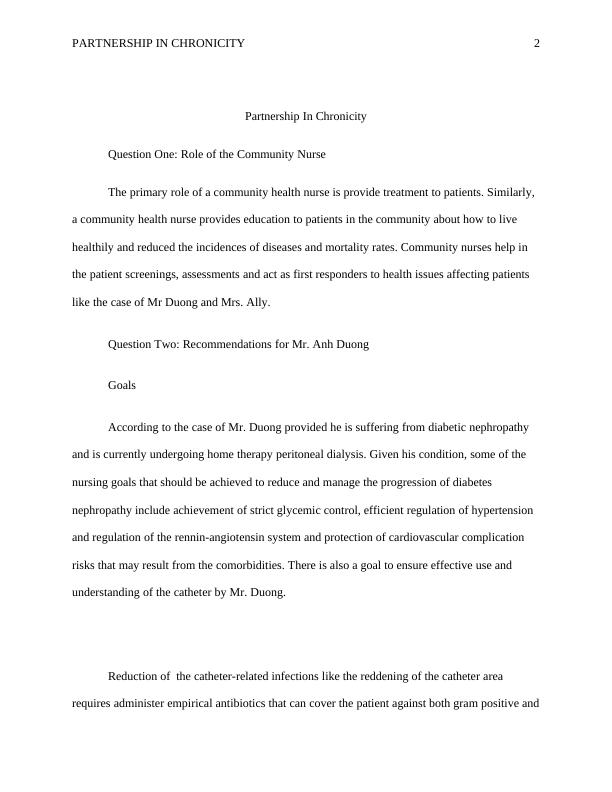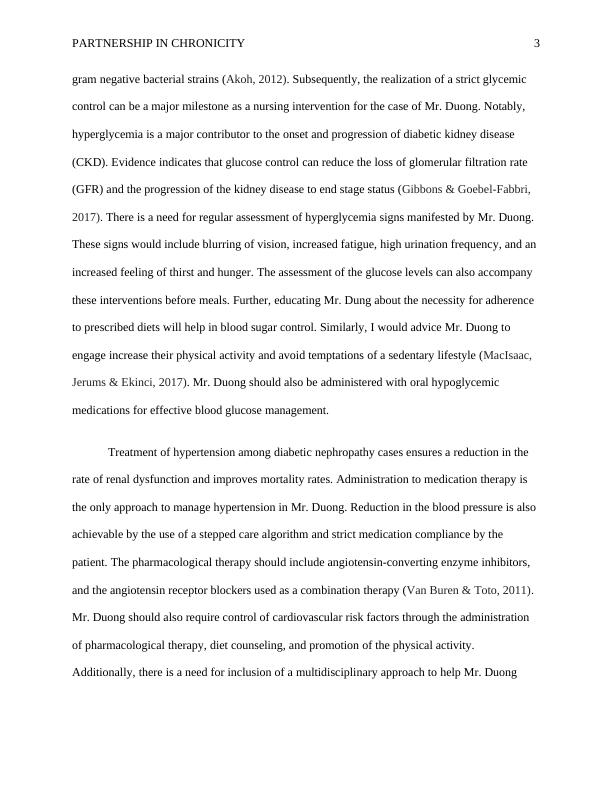Partnership in Chronicity
Added on 2022-11-26
6 Pages1118 Words326 Views
Running head: PARTNERSHIP IN CHRONICITY 1
Partnership in Chronicity
Name of Author
Institution
Date of Submission
Partnership in Chronicity
Name of Author
Institution
Date of Submission

PARTNERSHIP IN CHRONICITY 2
Partnership In Chronicity
Question One: Role of the Community Nurse
The primary role of a community health nurse is provide treatment to patients. Similarly,
a community health nurse provides education to patients in the community about how to live
healthily and reduced the incidences of diseases and mortality rates. Community nurses help in
the patient screenings, assessments and act as first responders to health issues affecting patients
like the case of Mr Duong and Mrs. Ally.
Question Two: Recommendations for Mr. Anh Duong
Goals
According to the case of Mr. Duong provided he is suffering from diabetic nephropathy
and is currently undergoing home therapy peritoneal dialysis. Given his condition, some of the
nursing goals that should be achieved to reduce and manage the progression of diabetes
nephropathy include achievement of strict glycemic control, efficient regulation of hypertension
and regulation of the rennin-angiotensin system and protection of cardiovascular complication
risks that may result from the comorbidities. There is also a goal to ensure effective use and
understanding of the catheter by Mr. Duong.
Reduction of the catheter-related infections like the reddening of the catheter area
requires administer empirical antibiotics that can cover the patient against both gram positive and
Partnership In Chronicity
Question One: Role of the Community Nurse
The primary role of a community health nurse is provide treatment to patients. Similarly,
a community health nurse provides education to patients in the community about how to live
healthily and reduced the incidences of diseases and mortality rates. Community nurses help in
the patient screenings, assessments and act as first responders to health issues affecting patients
like the case of Mr Duong and Mrs. Ally.
Question Two: Recommendations for Mr. Anh Duong
Goals
According to the case of Mr. Duong provided he is suffering from diabetic nephropathy
and is currently undergoing home therapy peritoneal dialysis. Given his condition, some of the
nursing goals that should be achieved to reduce and manage the progression of diabetes
nephropathy include achievement of strict glycemic control, efficient regulation of hypertension
and regulation of the rennin-angiotensin system and protection of cardiovascular complication
risks that may result from the comorbidities. There is also a goal to ensure effective use and
understanding of the catheter by Mr. Duong.
Reduction of the catheter-related infections like the reddening of the catheter area
requires administer empirical antibiotics that can cover the patient against both gram positive and

PARTNERSHIP IN CHRONICITY 3
gram negative bacterial strains (Akoh, 2012). Subsequently, the realization of a strict glycemic
control can be a major milestone as a nursing intervention for the case of Mr. Duong. Notably,
hyperglycemia is a major contributor to the onset and progression of diabetic kidney disease
(CKD). Evidence indicates that glucose control can reduce the loss of glomerular filtration rate
(GFR) and the progression of the kidney disease to end stage status (Gibbons & Goebel-Fabbri,
2017). There is a need for regular assessment of hyperglycemia signs manifested by Mr. Duong.
These signs would include blurring of vision, increased fatigue, high urination frequency, and an
increased feeling of thirst and hunger. The assessment of the glucose levels can also accompany
these interventions before meals. Further, educating Mr. Dung about the necessity for adherence
to prescribed diets will help in blood sugar control. Similarly, I would advice Mr. Duong to
engage increase their physical activity and avoid temptations of a sedentary lifestyle (MacIsaac,
Jerums & Ekinci, 2017). Mr. Duong should also be administered with oral hypoglycemic
medications for effective blood glucose management.
Treatment of hypertension among diabetic nephropathy cases ensures a reduction in the
rate of renal dysfunction and improves mortality rates. Administration to medication therapy is
the only approach to manage hypertension in Mr. Duong. Reduction in the blood pressure is also
achievable by the use of a stepped care algorithm and strict medication compliance by the
patient. The pharmacological therapy should include angiotensin-converting enzyme inhibitors,
and the angiotensin receptor blockers used as a combination therapy (Van Buren & Toto, 2011).
Mr. Duong should also require control of cardiovascular risk factors through the administration
of pharmacological therapy, diet counseling, and promotion of the physical activity.
Additionally, there is a need for inclusion of a multidisciplinary approach to help Mr. Duong
gram negative bacterial strains (Akoh, 2012). Subsequently, the realization of a strict glycemic
control can be a major milestone as a nursing intervention for the case of Mr. Duong. Notably,
hyperglycemia is a major contributor to the onset and progression of diabetic kidney disease
(CKD). Evidence indicates that glucose control can reduce the loss of glomerular filtration rate
(GFR) and the progression of the kidney disease to end stage status (Gibbons & Goebel-Fabbri,
2017). There is a need for regular assessment of hyperglycemia signs manifested by Mr. Duong.
These signs would include blurring of vision, increased fatigue, high urination frequency, and an
increased feeling of thirst and hunger. The assessment of the glucose levels can also accompany
these interventions before meals. Further, educating Mr. Dung about the necessity for adherence
to prescribed diets will help in blood sugar control. Similarly, I would advice Mr. Duong to
engage increase their physical activity and avoid temptations of a sedentary lifestyle (MacIsaac,
Jerums & Ekinci, 2017). Mr. Duong should also be administered with oral hypoglycemic
medications for effective blood glucose management.
Treatment of hypertension among diabetic nephropathy cases ensures a reduction in the
rate of renal dysfunction and improves mortality rates. Administration to medication therapy is
the only approach to manage hypertension in Mr. Duong. Reduction in the blood pressure is also
achievable by the use of a stepped care algorithm and strict medication compliance by the
patient. The pharmacological therapy should include angiotensin-converting enzyme inhibitors,
and the angiotensin receptor blockers used as a combination therapy (Van Buren & Toto, 2011).
Mr. Duong should also require control of cardiovascular risk factors through the administration
of pharmacological therapy, diet counseling, and promotion of the physical activity.
Additionally, there is a need for inclusion of a multidisciplinary approach to help Mr. Duong

End of preview
Want to access all the pages? Upload your documents or become a member.
Related Documents
Nursing Assignment: Diabetic Nephropathy and Peritoneal Dialysislg...
|6
|1227
|409
Type 2 Diabetes Assignmentlg...
|12
|2696
|149
Diabetes Mellitus: Progression to Microvascular and Macrovascular Complicationslg...
|16
|4593
|186
Risk factors and etiology of the patient Case Study 2022lg...
|7
|1770
|16
The rate of other chronic health issuelg...
|9
|2700
|11
Diabetes Mellitus | Case Studylg...
|3
|610
|346
